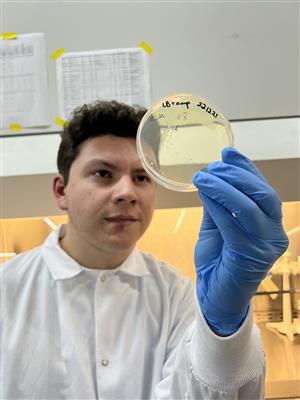Mason Matich
Two Central Bucks School District students were among the 300 teen scientists selected in the Regeneron Science Talent Search 2023, the nation’s oldest and most prestigious science and math competition for high school seniors.
Talent Search 2023, the nation’s oldest and most prestigious science and math competition for high school seniors.
This week, we shine a spotlight on the first of these two talented seniors - Mason Matich, a senior at CB East, who was cited for his work on space applications for DNA data storage. We look forward to featuring Lance Xu, a senior at CB West, who examined “The Framing Effect,’’ a study of the cognitive bias in which people’s decisions are swayed by the context surrounding a question, problem or event, in next week's Student Spotlight.
Each received a $2,000 cash prize, as did their respective high schools.
Now in its 101st year, the program sponsored by Society for Science attracted 1,949 applications from 627 high schools across 48 states, Washington, D.C., Puerto Rico and four other countries. Scholars were chosen based on their outstanding research, leadership skills, community involvement, commitment to academics, creativity in asking scientific questions and exceptional promise as STEM leaders, demonstrated by the submission of their original, independent research projects, essays and recommendations.
“The enthusiasm and quality of projects from this year’s participants were just outstanding,’’ said Maya Ajmera, President and CEO, Society for Science and Publisher, Science News. “Each year, I am tremendously impressed by the ingenuity that the students bring to the competition. Their hard work, creativity and perseverance should be applauded.”
Space Applications for DNA Storage
For Matich, that hard work involves an internship at the Pennsylvania Biotechnology Center through a program run through the Central Bucks School District. There, he and other high school students work inside a “Teaching Lab’’ where they are mentored and encouraged by professionals while operating independently. Says Matich, “It means that I was able to come up with my own research idea and sort of work with the equipment resources there, but not necessarily be working on a derivative of an existing research project.’’
Matich’s focus was on space applications for DNA data storage. Because DNA is many magnitudes denser than current storage methods, it could extend the mission times of deep space probes beyond what is currently possible. Says Matich, “A good way of thinking about it is that if you stored all the world's information in DNA, you could get it all into a 10x10 centimeter cube that you could fit in your hand.’’
Interested in science and engineering from an early age, Matich plans to major in mechanical engineering in college and pursue a career in aerospace and satellite technology.
He says his project has implications not only for space and the future, but for our immediate future here on earth.
“Current rates of data generation will exceed storage space within the next decade or two,” he says. “DNA is more resistant to ionizing radiation in space, is far denser than current methods of storage in space and has no requirement for constant power for use. This would allow for smaller, less power-hungry storage systems, all needed for deep space missions.
“The research done in this project can also be applied to earth-bound archival and consumer uses as well.”

